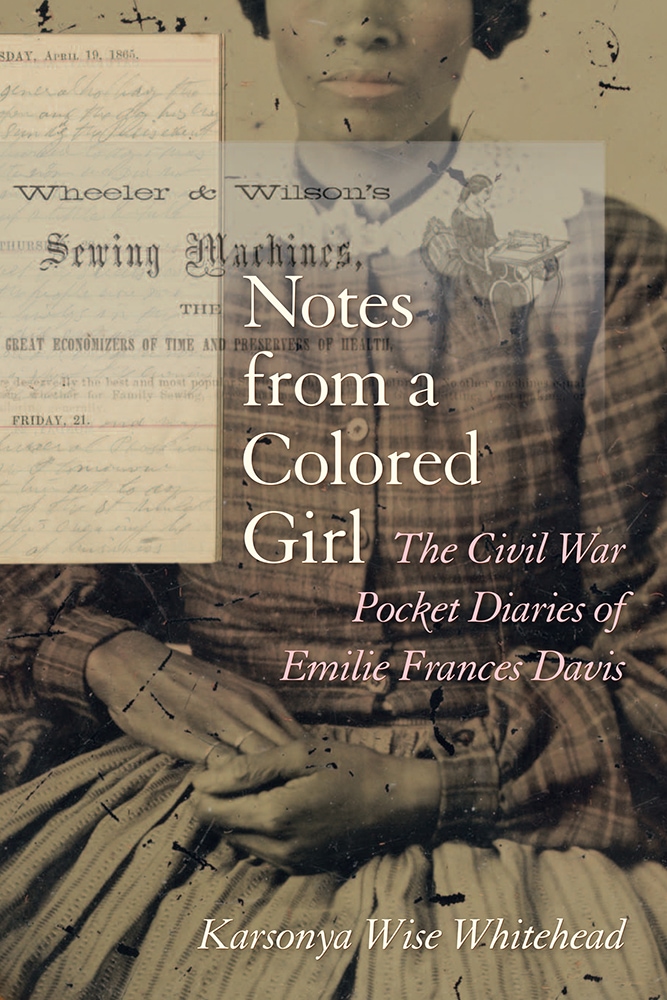Black History Month Sale: 40% off all books, plus FREE SHIPPING on all U.S. orders over $50 | Use code JBHM26

Size: 6 x 9
Pages: 296
Illustrations: 9 b&w halftones
Karsonya Wise Whitehead
The inclusion of this book in the Open Carolina collection is made possible by the generous funding of
"Straddling the lines of biography, argument-driven monograph, and historical editing, Whitehead's innovative approach should remain with readers in powerful ways."—The Journal of African American History
"It cannot be emphasized enough how important Davis's journals are to forwarding the study of nineteenth-century social history. Whitehead delivers a rare gem for readers in her well-written, well-researched work that will resonate with those interested in sociocultural history, Civil War-era history, African American history, women's history, or diaries and autobiographies. An absolute must-read."—Library Journal (starred review)
"Notes from a Colored Girl is a welcome addition to the rapidly growing body of scholarship on the history of free blacks in the antebellum Civil War-era North. It will undoubtedly prove indispensable to students and scholars."—Journal of American History
"Providing a coherent, cogent record of 19th-century life, this volume moves a woman of color from obscurity to significance."—Choice
"Readers of Whitehead's volume will be pleased with the text; moreover, scholars will be inspired to pursue new research projects thanks to Whitehead's excellent transcription, outstanding contextualization, and generous observations.Karsonya Wise Whitehead"—H-Net Reviews
"Notes from a Colored Girl is a beautiful testament to the personal life of a single free black woman, superbly reconstructed within the social, political, and religious life of free people of color in Civil War Philadelphia. Karsonya Wise Whitehead's meticulous attention to detail brings Emilie Francis Davis - a literate woman participating in and shaping the spaces of a free society near the contested borders of slavery - and her personal writings to life. Emilie's diary is an enduring legacy of the mundane and the extraordinary, carrying us through everyday moments of joy and tragedy, of sewing, socializing, church and school, all within the larger contextual landscape of a nation in upheaval and a community undergoing change. Whitehead treats us with a rare glimpse into a spirited and articulate single woman's interior world, revealing how she navigated the worlds of work, friendships, religion, family, politics, and community. A great addition to interdisciplinary studies, Notes from a Colored Girl is perfect for exploring the historic contours of race, gender, faith, freedom and community in the nation's most vibrant biracial city of the age."—Kate Clifford Larson, Ph.D., author of Bound For the Promised Land: Harriet Tubman, Portrait of an American Hero
"With Notes from a Colored Girl Karsonya Whitehead has painstakingly rendered the obscure visible and shed light on a singular figure whose life is a stand-in for millions of unknown stories. This is history at its most democratic and scholarship at its most vital."—William Jelani Cobb, associate professor of history and director, Institute of African American Studies, University of Connecticut
"'To day has bin a memorable day. I thank God I have bin here to see it.' So begins the pocket diaries of free black woman Emilie Davis of Philadelphia on the day of Emancipation at the midpoint of the Civil War. Her words also capture my feelings in seeing Davis's diaries published under the expert eye of Karsonya Wise Whitehead, whose scholarly annotations not only set the scene but reveal how this 'everyday' domestic-dressmaker's decision to record her thoughts at the critical hours of the African American journey was itself an emancipatory act."—Henry Louis Gates, Jr., Alphonse Fletcher University Professor, Harvard University
"This is a remarkable glimpse into the head of a Civil War-era African American woman. Emilie Davis's perspective shows her full consciousness of her role as a privileged urbanite. Whitehead's insightful historical/literary contextualization of Davis's journal makes this an invaluable contribution to our understanding of nineteenth-century communities."—Emma Lapsansky-Werner, professor of history, Haverford College
2014 Letitia Woods Brown Book Award winner for the Best Edited Book in African American History from the Association of Black Women Historians
Selected for Choice's Compilation of Significant University Press Titles for Undergraduates, 2013-2014
Copyright 2026
Website By Morweb.org